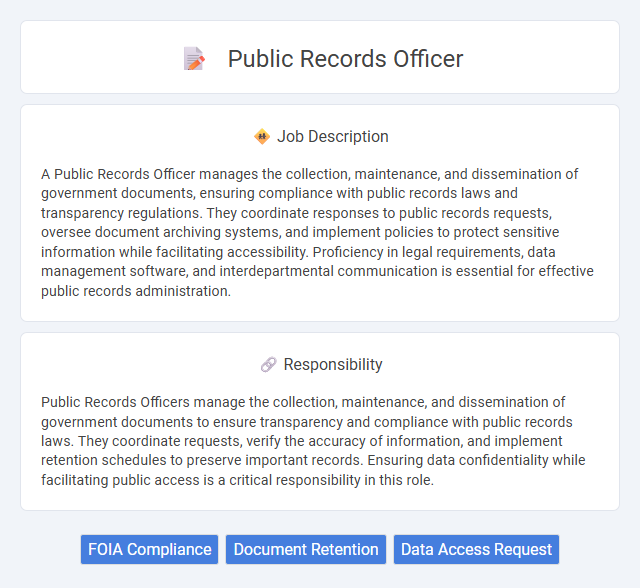
A Public Records Officer manages the collection, maintenance, and dissemination of government documents, ensuring compliance with public records laws and transparency regulations. They coordinate responses to public records requests, oversee document archiving systems, and implement policies to protect sensitive information while facilitating accessibility. Proficiency in legal requirements, data management software, and interdepartmental communication is essential for effective public records administration.
Individuals with strong organizational skills and attention to detail are likely suitable for the role of Public Records Officer, as the position requires managing and maintaining accurate public documents. People who prefer structured environments and have good communication abilities might find this job fitting, given the responsibility to handle public inquiries and ensure compliance with records laws. Conversely, those who struggle with meticulous record-keeping or face difficulty in handling confidential information could find the role challenging.
Qualification
A Public Records Officer must possess strong knowledge of state and federal public records laws, including the Freedom of Information Act (FOIA), to ensure proper management and disclosure of records. Key qualifications include excellent organizational skills, attention to detail, and the ability to handle sensitive information securely. Proficiency in document management systems and effective communication skills are essential to coordinate record requests and maintain compliance.
Responsibility
Public Records Officers manage the collection, maintenance, and dissemination of government documents to ensure transparency and compliance with public records laws. They coordinate requests, verify the accuracy of information, and implement retention schedules to preserve important records. Ensuring data confidentiality while facilitating public access is a critical responsibility in this role.
Benefit
Hiring a Public Records Officer likely enhances transparency and compliance within an organization, ensuring accurate maintenance and accessibility of public documents. This role may improve public trust by efficiently managing requests and safeguarding sensitive information. Organizations probably experience reduced legal risks and streamlined communication with regulatory bodies through effective public records management.
Challenge
Navigating the complexities of managing public records likely poses a significant challenge for a Public Records Officer, as they must ensure compliance with evolving regulations and privacy laws. The role probably involves balancing transparency with confidentiality, requiring meticulous attention to detail and robust organizational skills. Handling frequent requests efficiently while safeguarding sensitive information may often test their ability to maintain accuracy under pressure.
Career Advancement
Public Records Officer roles offer significant career advancement opportunities in government and legal sectors, with progressive responsibilities in information management and compliance. Expertise in managing public information requests and maintaining data integrity enhances prospects for positions such as Records Manager or Compliance Specialist. Mastery of relevant laws and digital archiving technologies is crucial for upward mobility in this field.
Key Terms
FOIA Compliance
A Public Records Officer manages the processing and release of government documents to ensure compliance with the Freedom of Information Act (FOIA). This role requires expertise in evaluating FOIA requests, redacting sensitive information, and maintaining accurate records to uphold transparency and legal standards. Effective coordination with legal teams and timely responses are essential to prevent litigation and foster public trust.
Document Retention
A Public Records Officer specializes in managing and safeguarding government documents to ensure compliance with legal document retention policies and regulations. They develop and implement systematic procedures for the classification, storage, and timely disposal of public records to maintain transparency and accountability. Expertise in digital archiving technologies and regulatory frameworks like the Freedom of Information Act (FOIA) is essential for optimizing data retrieval and protection.
Data Access Request
A Public Records Officer manages and fulfills Data Access Requests by overseeing the collection, processing, and release of public records in compliance with legal standards such as the Freedom of Information Act (FOIA). This role requires maintaining accurate databases, ensuring timely responses within statutory deadlines, and safeguarding sensitive information while promoting transparency. Expertise in electronic records management systems and knowledge of state and federal regulations are essential for efficient handling of data requests and minimizing risks of non-compliance.
 kuljobs.com
kuljobs.com